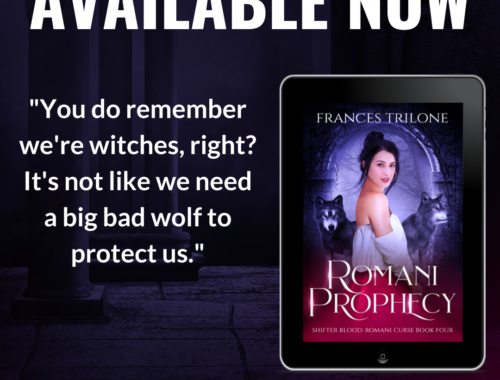
Romani Blood – Chapters 1 and 2
Chapter One
Ten words painted on a large wooden sign ended my silent treatment of Mom: Welcome to Woodlake, Home of Michigan’s Famous Fish Pie, Population 307.
“No freaking way. We’re not moving to ‘Fish Pie Hell’.” I sucked in air—trying to overcome the icky feeling in the pit of my stomach. Google hadn’t said anything about fish pies. Mom needed to see this was a bad idea. She had to turn this Jeep around. “Please, I’m begging you.”
“Sienna, stop whining.” She gave me her because-I’m-the-mom look and managed to smile, despite the dark circles under her eyes. “It won’t be that bad.”
“Not that bad?” I crossed my arms, readying myself for one last showdown. I had to convince her other options existed besides moving to her childhood town. “These people banished you from your home, and Dad never wanted us to live here. What would—”
“The dead can’t speak.” Mom made the sign of the cross and kissed the rosary beads around her neck. “Your dad was a good man. God rest his soul.”
I shifted in my seat, ignoring the jabbing sensation in my chest. We’d never talked about Dad. Never discussed his car accident. Never even had a funeral. “I’m saying we have other options. We don’t—”
“Crap,” she muttered, pulling the Jeep over.
Flashing blue lights lit up the early evening sky behind us and ended my showdown with Mom. Not that I’d had much of a chance. Once she made up her mind, no one could change it.
I glanced over my shoulder at the police car and groaned. One minute in Woodlake and this was our grand welcome. Could things get any worse?
A cop and a man wearing camouflage got out of the police car. They scanned the snow-covered trees on both sides of the two-lane road. They appeared anxious as they pulled big guns out from the back of the police car.
“What kind of crazy town is this? They have shotguns.” I touched the side of my right boot, ensuring the inside strap Mom had sewed on still held my hunting knife. It was a gift Dad had given me two years ago after he spent countless hours teaching me how to defend myself.
“Everyone carries guns around here.” She rolled down her window.
“Fish pies and shotguns. Sounds like a bad horror movie,” I said. “Were you speeding?”
“Romanies don’t speed. We don’t break gaje laws.” She pulled a scarf out of her purse and tied it around her head, forming a knot at the nape of her neck. Gaje was the Romani word for non-Romanies. A word I learned last week when Mom told me Romani blood flowed through my veins.
“Oh, now they’re gaje laws? What’s with that scarf on your head?”
“It’s a diklo. Married women wear them. I told you this already.” She rested both hands on the steering wheel and took several deep breaths.
“We left Dallas two days ago. You can’t expect me to remember everything.” I looked over my shoulder again. The man in camouflage stood by the police car with his shotgun pointed toward the woods while the cop headed our way. “Why didn’t you tell me about your family? You said I didn’t have anyone. Only you and Dad.”
“We talked about this already.” She gripped the steering wheel tighter and glanced in the rearview mirror. “Hush now. He’s coming.”
The cop lowered his shotgun and glanced through the window on Mom’s side of the Jeep. He looked at Mom’s diklo and frowned. “What are you gypsies doing out here?”
“We’re heading home.” Mom’s voice took on a super-sweet tone. She didn’t sound like her usual self.
The cop’s forehead crinkled. “I ain’t never seen you before. What’s your name?”
“Nells Stanescu,” she replied. “This is my daughter, Sienna.”
My head whipped around. Stanescu? That wasn’t our last name.
Seemed the closer we got to Woodlake, the less I recognized Mom. Like those rosary beads around her neck and that diklo. She’d never worn a scarf on her head before, and the rosary beads were new. She’d purchased them at a gas station as soon as we crossed the Michigan state line.
“You’re related to Henry?” The cop’s tone immediately became polite.
Mom nodded. “He’s my older brother.”
“He tell you ‘bout that missing tourist, Paige Bowen? We’ve been stopping cars all day. She went hiking in the woods last week. Nobody’s seen her since. ‘Bout five feet ten, brown hair, brown eyes. You seen her?” He held up a photo and looked at me. “She sorta looks like you.”
I glanced at the photo. I was surprised to see a face similar to mine, except this girl had to be an idiot. Why would anyone come to Woodlake? “It’s pretty cold outside for a hike.”
Mom nudged my leg. “We haven’t seen her.”
The cop tucked the photo into his shirt pocket and tapped the side of the Jeep with his hand. “It’ll be dark soon. Go straight to Romani ground and stay away from the woods.”
I pressed the side of my face against the window as Mom pulled the Jeep onto the road. Pine trees, pine trees, and more pine trees. Nothing but pine trees and wet snow. At least Google got the weather correct for this miserable end-of-March moving day.
“He called you a gypsy. Isn’t that a racial slur?” I asked.
“Yes,” Mom replied. “He must be new in town. The locals know not to use that word.”
I wanted to ask why she hadn’t corrected him but decided against it. “What do you think happened to that girl? Do you think one of the wolves got her? Google said this town’s crawling with large wolves.”
Mom said nothing. She didn’t even look my way.
I grabbed my backpack off the floor and pulled my cell phone out of the front pocket. Still no bars. Great. We were moving to the only place in the world without cell towers. “What’s Romani ground?”
“He’s talking about the Romani community. The town gave our ancestors land to live on.” She turned onto a gravel road and drove past two black gates. “This is it. We made it. Now that we’re Romanies, it’s important you—”
“I’m not a Romani, and my last name is Whitfield.” I sat up straight and hugged my backpack. “I agreed to follow a few rules. Not change my last name.”
“You’re half-Romani, and I said Stanescu because I knew the cop would recognize the name.” She sighed. “Promise me you’ll listen to your Uncle Henry. You’ll stay out of trouble and remember what I said about school.”
I shook my head and held back tears, remembering why I’d given Mom the silent treatment for the past three hours. She’d explained that Romani girls usually dropped out of school at age nine. Instead of graduating from high school and going to college, they helped around the house and learned the duties of being a wife. Definitely not how she’d raised me. My future had included college until Mom decided to yank me out of high school. “You said I couldn’t go to school. That’s absurd. I only have four classes left to graduate.”
“I didn’t say you can’t go to school. You just won’t graduate this June. Think of it as an extended spring break.” Mom grabbed a tissue and slowed the Jeep down. She coughed and spat blood into the tissue as I quickly looked away. “Do I need to remind you why we’re moving here?”
“No.” I didn’t want to think about the real reason for moving to Woodlake. Aside from having no money, Mom needed help. She needed her family around, and better healthcare than the doctors at the free health clinics in Dallas could provide. Stage three cancer: that’s what the doctor had told us two months ago. “Maybe I should drive the rest of the way?”
“No. We’re almost there,” she said. “You’ll go to college one day, Sienna. I promise.”
The gravel road turned into a paved street and houses appeared on both sides. Every house in the Romani community looked the same—brick homes with two-car garages, a small front porch, and neatly shoveled driveways. Nothing seemed out of place except for one large, unkempt lot. A half-charred house covered in snow occupied the middle of it.
“What happened to that house?” A chill crept down my spine and I shuddered.
“That’s the witch’s house. One of her spells went horribly wrong. The house caught on fire, and she died.”
“Witches? I thought you were joking about Woodlake being cursed.” I took one last look at the house before it disappeared from view.
“We never joke about the curse or speak ill of the witches. Don’t forget that.”
I sighed. Google said nothing about a fish-pie-cursed town with a missing girl and men with large guns. Why warn us to stay out of the woods? Wouldn’t it make more sense to search the woods for Paige if she went hiking?
Chapter Two
“Let’s focus on the future. If things go well, you’ll have a great life here. We’ll both be happy.” Mom patted my hand and turned onto the next street.
She parked the Jeep in front of a one-story brick house with a half-melted snowman in the yard. With a suitcase in one hand and my backpack slung over my shoulder, I followed her to the front porch. She smoothed her long black skirt and adjusted the diklo around her head.
Mom took several deep breaths. She tried to ring the doorbell, but her hands were shaking.
“You don’t have to do this,” I whispered.
Mom pushed the doorbell and gave me a gentle smile. “Everything’s going to be okay. You’ll see.”
I didn’t have to be a math genius to work out that Mom had left eighteen years ago because of me. When the Elders gave her permission to come home three days ago, I knew her cancer had taken a turn for the worse. Why else would she beg forgiveness and ask to come back?
A plump woman with short graying hair opened the front door. Her face lit up. “Nells. You made it.”
“Norma, it’s been. . .” The words stuck in Mom’s mouth as her eyes teared up.
I glanced at Norma, Mom’s sister-in-law, and held my hand out. I’d never had an Aunt before. “I’m your niece, Sienna.”
Aunt Norma ignored my hand and pulled both of us into a tight hug. “It’s so good to meet you.”
Mom broke down sobbing but managed to say a few Romani words—words I didn’t understand. They made Aunt Norma cry and hug us tighter.
A man in his mid-fifties appeared in the doorway. He looked like Mom, with a pointed chin and brown hair “You’re late,” he grunted.
Mom’s gaze lowered to the ground, and the sobbing ceased.
“Henry, doesn’t Nells look great?” Aunt Norma placed an arm around Mom’s shoulders. “Your sister hasn’t aged one bit.”
“Nells, you can take off that diklo. The Elders did away with that tradition.” Uncle Henry glanced at me with cold, dark eyes. “She’s your daughter?”
Mom nodded. “Sienna’s promised to follow the rules.”
“Like you did?” Uncle Henry snapped.
An uneasy feeling tugged at my chest. Unlike Aunt Norma, Uncle Henry didn’t look too thrilled to see us, which didn’t surprise me. Mom told me she’d never said bye to anyone, including her only brother. She just packed her bags and left town.
“Sienna’s nothing like me,” Mom said. “She won’t shame the family.”
“One screwup and you’re both gone.” Uncle Henry’s watch beeped three times. He pushed the front door wide open. “Get inside. We’re under curfew.”
Mom’s head jerked up. “Curfew?”
“Some hiker got lost.” Uncle Henry yanked the suitcase from Mom’s hand, shooed us inside, and locked the front door. “It happens every year. The Elders are being cautious.”
A teenage girl, whose favorite color had to be pink, appeared in the foyer. Pink shoes. Pink skirt. Pink earrings. She looked like a cross between Esmeralda and Malibu Barbie. She gave Mom a quick hug. “It’s nice to meet you, Auntie Nells. I can’t believe you’re finally here.”
“Drina,” grunted Uncle Henry. “Show Sienna her room.”
“Of course, Daddy.” Drina grabbed my suitcase and gave me a smile. “Hope you’re hungry. Mom made fish pie.”
Fish pie? I wanted to groan, but kept quiet as I followed Drina.
We walked down the hallway and passed a nice living room with a large flat screen TV, couches, a coffee table, and a fireplace. The dining room was on the left side of the house, across from the living room, and next to a modern kitchen with white appliances. Three bedrooms and an office were located at the back of the house.
Drina led me to a bedroom with a dresser, two beds, two nightstands, a bathroom, and a walk-in closet. This bedroom was spotless. There was nothing out of place, and except for a teddy bear on the dresser, it didn’t look like a typical teenager’s room. There was no stuff scattered about or posters of hot guys.
“I emptied the bottom two drawers of the dresser.” She put my suitcase on the bed closest to the window and closed the door. “The left side of the closet and that nightstand are all yours.”
“Thanks.” I dropped my backpack on the bed, unzipped my suitcase, and shoved a few things into the nightstand. At least my only cousin in the world seemed nice.
“How was your trip?” Drina sat on her bed and crossed her legs.
“It was long.” I glanced at a framed photo on Drina’s nightstand. It was a photo of Drina and a guy with dark brown hair and brown eyes. “Who’s the guy?”
“That’s Victor.” She tilted her head. “Did you have any boyfriends in Texas?”
“Not really. Mom was pretty strict about dating.” I dragged my suitcase into the closet and hung up my clothes, being careful not to touch a hot-pink prom dress on my side. Mom had mentioned Drina had dropped out of school and could barely read or write. Why would she need a prom dress?
I left the closet, surprised to see Drina standing by my bed and rifling through my backpack. “What are you doing?”
“What’s this?” She pulled a book out of my backpack. She ran her fingers along the spine and skimmed through the pages, stopping at the tattered butterfly bookmark.
“It’s a classic love story.” I took the book from her and hugged Dad’s copy of Romeo and Juliet to my chest; it was one of the few books Mom had allowed me to keep when she donated the rest of our belongings to charity.
“So, it’s true. You can read?”
I nodded. “None of that matters anymore. Mom said I can’t go to school here.”
“School’s boring.” Drina sat on her bed again. “Did you see your dress in the closet?”
“What dress?”
“The hot-pink one. I know it’s last minute, but we’re cousins.”
What was Drina talking about? That short, hot-pink dress was not my style. Why did I need it?
A knock on the bedroom door interrupted our conversation.
“Come in,” Drina said.
The guy from the framed photo on Drina’s nightstand walked into the room, wearing blue jeans, and a red polo shirt. Unlike the photo, he wore his dark brown hair slicked back on both sides, and his brown eyes looked hazel. He gave me a blank stare when our eyes met.
“Dinner’s done,” he said.
“This is Victor Macek, my fiancé.” Drina looped an arm around Victor.
“You’re engaged?” I blurted, hoping my eyes didn’t pop out. Mom hadn’t said anything about Drina being engaged. We were both seventeen years old and Victor looked older. Definitely in his twenties.
“We’re getting married next weekend.” She smiled. “You’re one of my bridesmaids.”
“But. . .” I closed my mouth, remembering what Mom had said about Romani girls dropping out of school to learn wife duties. They also got married young. Well, that explained the hot-pink dress in the closet. “Congratulations.”
“You can try the dress on later,” she said. “You’ll have this room to yourself after the wedding. Victor’s built us a house, not too far from here. It’s cute and has three bedrooms.”
“Everyone helped build it,” he mumbled.
My own bedroom, with a bathroom and walk-in closet? Maybe my luck had finally turned around. I pulled my cell phone out of my backpack and walked closer to the window. Two bars, but no text messages, or missed calls. Not that I expected to hear from anyone, as my supposed high school friends had kept their distance after I’d told them Mom was a Romani.
Drina gasped. “You can’t have that.”
“What?” I held my cell phone higher. Maybe if I had three bars, a text message might appear.
“It’s a rule. No cell phones.” Victor held out his hand. “Give it here.”
I swallowed hard and tucked my cell phone into the front pocket of my jeans. No way was Victor taking my cell phone. “It doesn’t work.”
His bottom lip twisted. “No exceptions.”
“You’re not taking it.” I glared at Victor, daring him to grab my cell phone. Mom hadn’t said anything about a rule on cell phones. If she had, I’d remember.
“Daddy’s not going to like this.” Drina folded her arms. “You’re here for five minutes and already breaking the rules.”
“Dinner’s getting cold.” Uncle Henry appeared in the doorway and glanced at Victor. “What’s the problem?”
“She won’t give me her cell phone,” Victor replied.
“It has photos of my dad,” I pleaded. I knew Uncle Henry always had the final word in family matters—at least, that’s what Mom had said. “I’ll do anything you want.”
Uncle Henry looked at me and smiled. “Keep your phone. You’ll need it for your job.”
~~~~~
During dinner, Aunt Norma talked on and on about Drina’s wedding, but Uncle Henry said nothing about my job. Yesterday, Mom had told me I’d spend my days cleaning houses and learning how to read palms for the community’s fortune-telling business. She’d never said anything about a job.
I ate another bite of fish pie, hoping this dish wasn’t something Aunt Norma cooked all the time. It looked exactly like chicken potpie with a flaky crust but stuffed with fish and cabbage instead of chicken and vegetables.
Uncle Henry finished eating and leaned back in his chair. “The Elders came by last night. They want Sienna to work at Le Loup Gris.”
Le Loup Gris? The words sounded French.
“Absolutely not.” Mom glared at Uncle Henry. “She’s a Romani now. They can’t ask her to work in town.”
“They’re not asking,” Uncle Henry replied in a firm tone. “She has to do this.”
Mom jumped to her feet, ranting in their native Romani language. Whatever she was saying didn’t please Uncle Henry, it only made him angry.
“We should talk in my office.” Uncle Henry stood and tossed his napkin onto the table. “Sienna, stay here.”
I watched Mom follow Uncle Henry out of the dining room, surprised she’d broken the first rule she insisted I learn—don’t speak back to Romani men.
Victor pulled a cell phone out as Aunt Norma and Drina took our plates to the kitchen.
“You have a cell phone?” I asked, still annoyed he’d tried to take mine away.
“Of course,” he replied. “But you’re not engaged or married, so you shouldn’t have one. It’s a rule.”
That’s ridiculous. Mom definitely hadn’t mentioned that rule. “What’s Le Loup Gris?”
“It’s the Gray Wolf Café in town.” His fingers pecked away at his cell phone screen.
I waited a few seconds, hoping Victor might offer more information about the café. “When am I supposed to start working there?”
“Henry will explain everything.” He slid his cell phone back into his pocket, got up, and headed to the living room.
Voices drifted from the kitchen. I strained to hear what Aunt Norma and Drina were discussing. More nonsense about her wedding and the guest list. Nothing about my new job.
“Where’s Victor?” Uncle Henry entered the dining room and sat across from me.
“He’s in the living room.” I glanced into the empty hallway. “Where’s my mom?”
“She’s taking a hot bath.” He clasped his hands on the table. “You look nothing like my sister. She said your father died a few months ago. I’m sorry to hear about his accident.”
I glanced at Uncle Henry. Why would he care about my dad? He’d been a gajo, a non-Romani. And Mom always took showers. Something about sitting in water bothered her. Uncle Henry had to be lying.
“What do you know about Woodlake?”
“It’s a small town, famous for its fish pie.” I shrugged. “And the gaje gave land to the Romanies.”
“That’s right. We’ve coexisted with the locals for a long time. It’s one of the reasons we don’t have to move around.” He cleared his throat. “Did Nells tell you about the Norwood wolves?”
I nodded. “They’re dangerous, and they don’t like the Romanies, so we stay away from them.”
“Yes. Stay out of the woods,” he said.
Aunt Norma came out of the kitchen, carrying a glass full of whiskey. She set the glass down in front of Uncle Henry and returned to the kitchen.
“Le Loup Gris is a café in town and they need some help.” Uncle Henry picked up the glass. “I already talked to the owner, and he’s agreed to let you work there. Have you ever had a job?”
“I’ve babysat and tutored students in math.” I sat up straight, trying to hide my excitement. “Is Mom okay with this? She wanted me to clean houses and read palms with Aunt Norma.”
“Don’t worry about your mom.” He swirled the whiskey in his glass. “You won’t be cleaning houses, but you’ll still need to learn how to read palms. The Elders won’t budge on that, so I got a few books for you. Nells said you know how to read. When you’re not working, I want you studying, and learning from Norma. Are we clear on what I expect from you?”
“Yes,” I replied, nodding. A job at a café sounded better than cleaning houses all day.
“You start work tomorrow. It’ll be mostly washing dishes and helping in the kitchen. Whatever they need done, you do it without complaining. I’ll keep half your paycheck and—”
“That’s not fair.” My face twisted. “I’m the one doing all the work. Why am I giving—”
He pounded his fist on the table. “You will not disrespect me.”
I refused to look away. I didn’t care he was pissed at me for talking back. It was bad enough I had to follow their rules, but him keeping half my paycheck was wrong.
“Do I need to remind you why you’re here?” Uncle Henry took another gulp of whiskey. “Your mother’s sick and needs treatment. She begged the Elders to allow her to come back, and I convinced them it was a good idea. We take care of our own here, and that includes paying for Nells’ hospital bills. Everyone with a job is pitching in to help, including you. That’s why I’m keeping half your paycheck. I expect you to start acting like a Romani. Are we clear on this?”
“Yes,” I mumbled.
“One more thing, I talked to the Elders about your cell phone. They agreed to let you keep it, but we have some conditions.”
My heart sank. “What are they?”
“You can take the phone to work, but it goes on my desk when you get home. They want your phone number changed, too.”
“Okay.” Well, that sucked, but at least Uncle Henry hadn’t said anything about deleting old photos or contact numbers. I could still text and make phone calls while working at the café.
“Don’t tell anyone at the café you’re a Romani. They’ll find out soon enough.” Uncle Henry drank the rest of his whiskey. “Get the waitresses to trust you, and then you can tell me what the gaje are saying.”
“You want me to spy?”
He leaned toward me with narrowed eyes. “I want you to keep your eyes and ears open.”
I took a deep breath, disliking the idea of spying, but I didn’t have a choice. I had to follow their rules and stay out of trouble. I had to help Mom.




